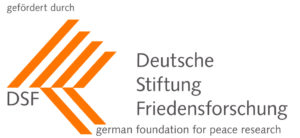Genderbeziehungen im begrenzten Raum. Bedingungen, Ausmaß und Formen von sexueller Gewalt an Frauen in kriegsbedingten Flüchtlingslagern
Gender Relations in Confined Spaces. Conditions, Scope and Forms of Violence against Women in Conflict-related Refugee Camps
.
 Förderung: Deutsche Stiftung Friedensforschung (DSF)
Förderung: Deutsche Stiftung Friedensforschung (DSF)
Laufzeit: 09.2013-04.2016
Projektleitung: Susanne Buckley-Zistel
Projektmitarbeitende: Ulrike Krause
Projektanbindung: Zentrum für Konfliktforschung, Philipps-Universität Marburg
.
Unter der Leitung von Prof. Susanne Buckley-Zistel konzentriert sich das Projekt Genderbeziehungen im begrenzten Raum. Bedingungen, Ausmaß und Formen von sexueller Gewalt an Frauen in kriegsbedingten Flüchtlingslagern auf den Nexus zwischen Dislokation, Genderbeziehungen und sexualisierter Gewalt, um das Gewaltkontinuum in Postkonfliktkontexten oder am Rande von Kriegsschauplätzen zu analysieren. Dies beruht auf dem in der Wissenschaft vermehrt hervorgehobenen Argument, dass viele Frauen Gewalt im Kontext von gewaltsamen Konflikten anders erfahren, da diese häufig sowohl zeitlich als auch räumlich außerhalb von Kriegsschauplätzen stattfindet. Dichotomien wie vor vs. nach dem Waffenstillstand, öffentlicher Kriegsschauplatz vs. das eigene, private Zuhause, sowie feindliche Kombattanten vs. vertrauenswürdige Familienmitglieder lassen sich nur schwer aufrecht erhalten. Ob und wie sich dies im kriegsbedingten Flüchtlingslager manifestiert, ist daher ein bedeutender Beitrag zur Ausdifferenzierung von Geschlechterperspektiven in der Friedens- und Konfliktforschung.
Unser Ausgangspunkt ist die Annahme, dass Flüchtlingslager begrenzte Räume sind, in denen Geschlechterbeziehungen neu verhandelt und definiert werden. Dies geschieht sowohl homosozial innerhalb der Kategorien Männer bzw. Frauen, als auch heterosozial zwischen den Kategorien Männern und Frauen. Basierend auf dem Ansatz der hegemonialen Männlichkeit von Raewyn Connell vermuten wir, dass das Leben in Flüchtlingslagern mit einer subjektiv empfundenen Abwertung von Maskulinität einhergeht und diese durch das Ausüben von Gewalt an Frauen im häuslichen, privaten Raum kompensiert wird. Ob dies der Fall ist, soll durch das Forschungsprojekt empirisch überprüft werden. Zur breiten Erfassung von Daten verwendet das Projekt einen Methodenmix aus verschiedenen sozialwissenschaftlichen Ansätzen, der den besten Einblick in Mikro- und Mesoebenen verspricht. Die Feldforschung basiert daher auf einer Komposition aus Literaturanalyse, teilnehmender Beobachtung, problemorientierten und ethnographischen Interviews, ero-epischen Dialogen sowie Gruppendiskussionen. Die Triangulation verschiedener Methoden dient neben der Validierung der Ergebnisse auch dem Erhalten zusätzlicher Erkenntnisse.
Der Abschlussbericht ist online zugänglich über die Reihe Forschung DSF: Link